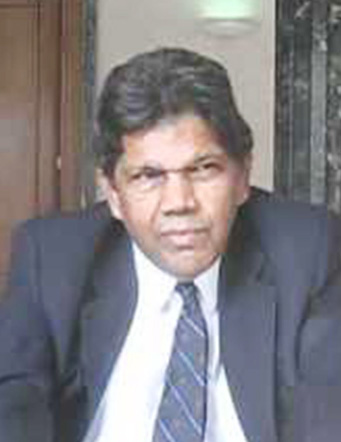By Dr Bertrand Ramcharan
The latest issue of Foreign Affairs has a riveting article by Professor Michael Beckley of Tufts University on the emerging world order. Guyana, which is an emerging energy power on the world stage, would do well to take note.
The strongest international orders in modern history, Beckley wrote, have been alliances built by great powers to wage security competition against their main rivals. Order-building usually needs a common enemy. Progress on transnational issues, when achieved, has emerged largely as a by product of hardheaded security cooperation, rather than idealistic liberal cooperation.
Liberal internationalists, he noted, associate international order with peace and harmony. Historically, however, international orders have been more about keeping rivals down than bringing everyone together. In this perspective, the United Nations and its Charter are secondary to Great Power calculations.
Beckley thinks that the liberal order, like all international orders, “is a form of organized hypocrisy that contains the seeds of its own demise.” He considers that the liberal order is, in fact, deeply exclusionary. By promoting free markets, open borders, democracy, supranational institutions, and the use of reason to solve problems, the order challenges traditional beliefs and institutions that have united communities for centuries: state sovereignty, nationalism, religion, race, tribe, family. Enter Donald Trump!
The liberal order, he adds, is ill-equipped to handle pressing global problems such as climate change, financial crises, pandemics, digital disinformation, refugee influxes, and political extremism, many of which are arguably a direct consequence of an open system that promotes the unfettered flow of money, goods, information, and people across borders.
The emerging world order, Beckley submits, is being forged through American competition with China. China, in Beckley’s assessment, has become a potent anti democratic force, selling advanced tools of tyranny around the world. In opposition to China, disparate actors, led by the USA, are joining forces to roll back China’s power. “In the process, they are reordering the world.”
The emerging anti China order, Beckley points out, departs fundamentally from a liberal order, because it is directed at a new threat. The architecture of the new order is a work in progress. Two features are already discernible: The first is a loose economic bloc anchored by the G-7, the group of democratic allies that controls more than half of the world’s wealth. They are establishing new institutions as the groundwork for the emerging order such as the US-EU Trade and Technology Council, which creates common transatlantic standards for screening exports to China and investment there in artificial intelligence and other cutting technology. Also, the Export Controls and Human Rights Initiative is intended to do the same for technologies that could support ‘digital authoritarianism’.
The second feature of the emerging order is a double military barrier to contain China. The inside layer consists of rivals bordering East China and the South China Seas. This inside layer is bolstered by an outside layer of democratic powers such as Australia, India, the UK, and the USA, which are providing aid, arms and intelligence to China’s neighbours.
This security cooperation is becoming stronger and more institutionalized. Witness the Quad, a coalition made up of Australia, India, Japan and the USA, which seeks to maintain the territorial status quo in East Asia and to protect Taiwan.
Viewed collectively, these efforts to compete with China evince a positive vision of a democratic order, one that differs fundamentally from China’s mercantilist/authoritarian model, and also from the old international order with neoliberal orthodoxy at its core. By infusing labour and human rights standards into economic agreements, the new vision prioritizes people over corporate profits and state power. “By linking democratic governments together in an exclusive network, the new order attempts to force countries to make a series of value judgments and imposes real penalties for illiberal behaviour.”
Beckley comments that if China continues to scare democracies into collective action, this could usher in the most consequential changes to global governance in a generation or more. “The emerging clash of systems will define the twenty-first century and divide the world”. China will view the emerging democratic order as a containment strategy designed to strangle its economy and topple its regime. In response it will seek to protect itself by asserting greater military control over its vital sea-lanes.
Beckley foresees that in the coming years, the trade and technology wars between China and the United States will rage on as both sides try to expand their respective spheres. China and the US will push their partners to pick sides, compelling them to re-route their supply chains and adopt wholesale the ecosystem of technologies and standards of one side’s order. The Internet will be split in two, as will digital technology. Political warfare between the two systems will intensify as each tries to undermine the domestic legitimacy and international appeal of its competitor. The standoff will end only when one side defeats or exhausts the other.
Beckley concludes: If there is any hope, it lies in a renewed commitment to democratic values. The United States and its allies share a common aspiration for an international order based on democratic principles and enshrined in international agreements and laws. Beckley thinks that the core of such an order is being forged in the crucible of competition with China and could lead to a genuinely free world. “But to get there, the US and its allies will have to embrace competition with China and march forward together through another long twilight struggle.”
Chinese analysts will undoubtedly offer a different presentation from this, as is to be expected. The hard fact of the matter, however, is that China and the USA are engaged in a global struggle for resources and over their visions for the world. “This clash of systems”, Beckley writes, “will define the twenty first century and divide the world.”
Which leads to the question: “What will be Guyana’s Foreign Policy in this clash of the titans?”





